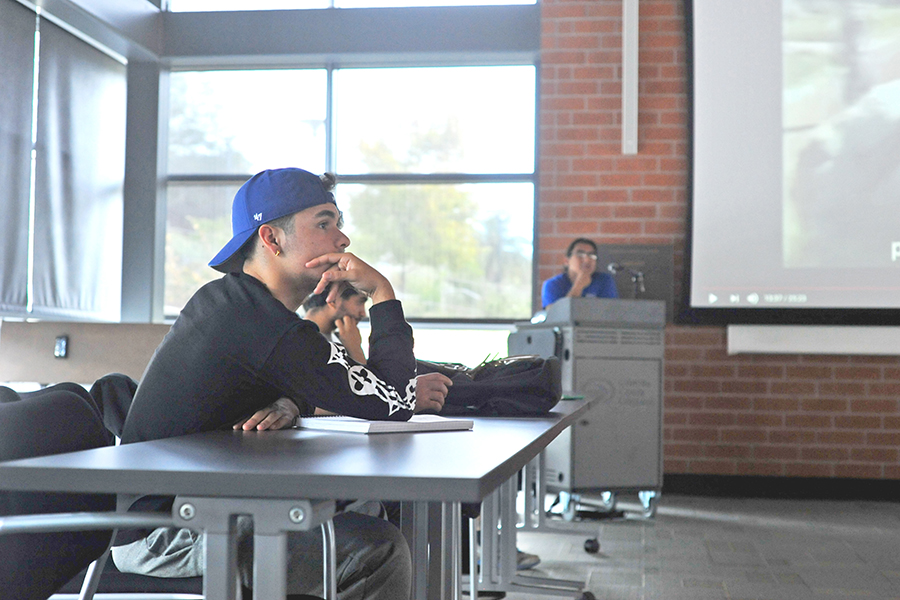Military school on watch after connection to violence
Communications major Andrew Magnoli listens to a seminar on American militarism in Latin America delivered by Mexican journalist Eduardo Garcia in the Fireside Hall on Sept. 18.
Sep 28, 2017
Mexican journalist Eduardo Garcia connected U.S. militarism in Latin America with racism and injustice experienced by people of color inside U.S. borders in a talk presented by La Raza studies department at Contra Costa College Sept. 18.
Garcia is an organizer with the School of Americas Watch, which is dedicated to closing the school and ending the violent interventions that support U.S. business interests throughout Latin American countries.
“The School of Americas was closed in 2000 and reopened with a different name in the same location with the same mission,” Garcia said.
The school is run by the U.S. Department of Defense and it is now known as the Western Hemisphere Institute for Security Cooperation or WHIN SEC located at Fort Benning, Georgia.
Garcia said, the School of Americas is also known as the School of Assassins because paramilitary groups that trained at the school have been involved in numerous assassinations of Latin American leaders.
The most famous Archbishop of El Salvador Oscar Romero who was murdered while delivering mass to his congregation in 1980. Garcia outlined the painful history of violence perpetrated by the school’s trainees up to the 2016 murder of Indigenous leader and environmental activist Berta Caceres.
U.S. trained paramilitaries have been foundational mercenary forces for violent drug cartels like Sinola and Los Zetos and they often operate in revolving door cycles with government special forces, said Garcia.
When working for governments these military groups enforce economic policies that impoverish local communities and pave the way for outside business interests. The cartels basically operate in a similar fashion, violently extracting profits at the expense of Latin American people.
Dr. Agustin Palacios, La Raza studies department chairperson and La Raza professor said, “It’s good that he (Garcia) is trying to make connections about the lack of accountability that exists on the part of our own government so we don’t think it’s only developing countries that deal with abuse by authority.”
Lucile Beatty, dean of Library, Automotive and Vocational Education and Athletics, who coordinated with the La Raza department to bring the talk to CCC, brought up parallels to the Dakota Access Pipe Line (DAPL) protests in North Dakota.
“We often talk of Latin American paramilitary groups that have no direct relation to the government,” she said. “In the case of the Water Protectors private security forces were responsible for much of the violence. We are moving more in that same direction with private security forces that have no congressional oversight.”
Garcia said, “Mexico has become one of the most dangerous countries in the world for journalists. Seven of my friends have been killed all of whom were journalists.”
After much of the news about the violence is shut down through intimidation tactics, U.S. Border Patrol then funnels refugees of this violence to the most dangerous parts of the border.
“People are forced to cross deserts or areas that are under control by cartels. The intention is to make migration so dangerous that people will be too afraid to do it but they’re still coming,” Garcia said.
Garcia is touring colleges in the U.S. to raise awareness about the School of Americas (WHIN SEC) and to build solidarity with local minority communities.
“The talk opened my eyes about the U.S. government and now I want to learn more about it,” said La Raza studies student Elizibeth Guiterrez. “I didn’t know that being a journalist in Mexico was so dangerous.
“My family is from Mexico, so I am not surprised, but it is still hurtful to hear about the violence.”



Lee Rials • Oct 11, 2017 at 9:27 am
This is not a letter to be published, just a thank you for posting the previous note I sent. I am a bit surprised my letter did not evoke a response, or a contact, but we are open and welcome visitors.
Sincerely, Lee Rials
Lee Rials • Oct 3, 2017 at 10:00 am
Friends, this came to me via Google Alert, and I ask, before you accept all Mr. Garcia told you about the “School of the Americas” (closed for almost 17 years), you might want to look at the Western Hemisphere Institute for Security Cooperation website and Facebook pages. Better yet, if you have the opportunity to come to Georgia, you will be welcome to come to the Institute and see who we are and what we do. In past years, when there were well-attended protests at the gate of Fort Benning, we invited many in to tour our facilities and talk with a panel of experts. There were many from the Bay area, but I don’t recall anyone from Contra Costa College. Suffice it to say, I believe you will find that Mr. Garcia is misinformed, ill-informed, and not knowledgeable about us. Call me or email me; I will answer. You can find the contact information on our website. Sincerely, Lee Rials, WHINSEC Public Affairs